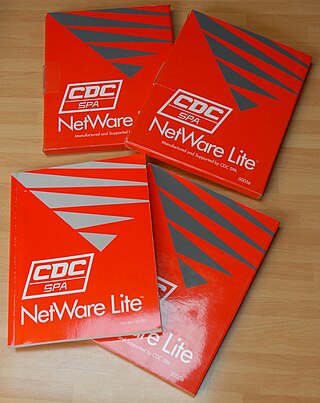Related Research Articles
Internetwork Packet Exchange (IPX) is the network-layer protocol in the IPX/SPX protocol suite. IPX is derived from Xerox Network Systems' IDP. It also has the ability to act as a transport layer protocol.

Novell, Inc. was an American software and services company headquartered in Provo, Utah, that existed from 1980 until 2014. Its most significant product was the multi-platform network operating system known as Novell NetWare.
Uptime is a measure of system reliability, expressed as the period of time a machine, typically a computer, has been continuously working and available. Uptime is the opposite of downtime.

NetWare is a discontinued computer network operating system developed by Novell, Inc. It initially used cooperative multitasking to run various services on a personal computer, using the IPX network protocol.
IPX/SPX stands for Internetwork Packet Exchange/Sequenced Packet Exchange. IPX and SPX are networking protocols used initially on networks using the Novell NetWare operating systems. They also became widely used on networks deploying Microsoft Windows LANs, as they replaced NetWare LANs, but are no longer widely used. IPX/SPX was also widely used prior to and up to Windows XP, which supported the protocols, while later Windows versions do not, and TCP/IP took over for networking.

Network-attached storage (NAS) is a file-level computer data storage server connected to a computer network providing data access to a heterogeneous group of clients. The term "NAS" can refer to both the technology and systems involved, or a specialized device built for such functionality.
Btrieve is a transactional database software product. It is based on Indexed Sequential Access Method (ISAM), which is a way of storing data for fast retrieval. There have been several versions of the product for DOS, Linux, older versions of Microsoft Windows, 32-bit IBM OS/2 and for Novell NetWare.

UnixWare is a Unix operating system. It was originally released by Univel, a jointly owned venture of AT&T's Unix System Laboratories (USL) and Novell. It was then taken over by Novell. Via Santa Cruz Operation (SCO), it went on to Caldera Systems, Caldera International, and The SCO Group before it was sold to UnXis. UnixWare is typically deployed as a server rather than a desktop. Binary distributions of UnixWare are available for x86 architecture computers. UnixWare is primarily marketed as a server operating system.

Multiuser DOS is a real-time multi-user multi-tasking operating system for IBM PC-compatible microcomputers.
The NetWare Core Protocol (NCP) is a network protocol used in some products from Novell, Inc. It is usually associated with the client-server operating system Novell NetWare which originally supported primarily MS-DOS client stations, but later support for other platforms such as Microsoft Windows, the classic Mac OS, Linux, Windows NT, Mac OS X, and various flavors of Unix was added.

Univel, Inc. was a joint venture of Novell and AT&T's Unix System Laboratories (USL) that was formed in December 1991 to develop and market the Destiny desktop Unix operating system, which was released in 1992 as UnixWare 1.0. Univel existed only briefly in the period between AT&T initially divesting parts of USL in 1991, and its eventual outright purchase by Novell, which completed in June 1993, thereby acquiring rights to the Unix operating system. Novell merged USL and Univel into their new Unix Systems Group (USG).

iFolder is an open-source application, developed by Novell, Inc., intended to allow cross-platform file sharing across computer networks.
LANtastic is a peer-to-peer local area network (LAN) operating system for DOS and Microsoft Windows. The New York Times described the network, which permits machines to function both as servers and as workstations, as allowing computers, "to share printers and other devices."
iPrint is a print server developed by Novell, now owned by Micro Focus. iPrint enabled users to install a device driver for a printer directly from a web browser, and to submit print jobs over a computer network. It could process print jobs routed through the internet using the Internet Printing Protocol (IPP).
Remote Initial Program Load is a protocol for starting a computer and loading its operating system from a server via a network. Such a server runs a network operating system such as LAN Manager, LAN Server, Windows NT Server, Novell NetWare, LANtastic, Solaris or Linux.
Novell Embedded Systems Technology (NEST) was a series of APIs, data formats and network protocol stacks written in a highly portable fashion intended to be used in embedded systems. The idea was to allow various small devices to access Novell NetWare services, provide such services, or use NetWare's IPX protocol as a communications system. Novell referred to this concept as "Extended Networks", and when the effort was launched they boasted that they wanted to see one billion devices connected to NetWare networks by year 2000. NEST was launched in mid-1994 countering Microsoft's similar Microsoft at Work efforts, which had been launched in 1993.

NetWare Lite and Personal NetWare are a series of discontinued peer-to-peer local area networks developed by Novell for DOS- and Windows-based personal computers aimed at personal users and small businesses in the 1990s.
FlexOS is a discontinued modular real-time multiuser multitasking operating system (RTOS) designed for computer-integrated manufacturing, laboratory, retail and financial markets. Developed by Digital Research's Flexible Automation Business Unit in Monterey, California, in 1985.
DOS Protected Mode Services (DPMS) is a set of extended DOS memory management services to allow DPMS-enabled DOS drivers to load and execute in extended memory and protected mode.
References
- Causey, James. "Part IV: The Right OS for the Job; Chapter 22: NetWare - A Brief History of NetWare". High-Performance Networking Unleashed. Macmillan Computer Publishing. Archived from the original on 2018-09-02. Retrieved 2018-09-02.
{{cite book}}:|work=ignored (help) - White, Jr., Roger Bourke (2010). "Hardware Independence". Surfing the High Tech Wave: A story of Novell's early years, 1980-1990. Archived from the original on 2018-09-02. Retrieved 2018-09-02.
- "LAN Tech" (in Korean). Archived from the original on 2006-02-10.